Council Tackles Police Overtime Oversight and a Wide Range of Year-end Legislation

With the third-to-last Legislative Meeting of the 2019-2020 Council Period now behind us, time is getting tight for legislation to receive the necessary two votes and come to full fruition prior to the end of this two-year cycle.
The legislation passed at the most recent meeting ran the gamut chronologically—from stories straight out of the most recent headlines to righting a historical wrong.
With recent white supremacist rallies on one hand, and election victory rallies and Black Lives Matter protests on the other, the Metropolitan Police Department has been very busy on our streets in recent weeks and months. And with the federal government shortchanging the District in stimulus legislation, and ten of millions of dollars in arrears to us by the federal government for past reimbursable services we have provided, it was no surprise that MPD was racking up the overtime. However, when the Council was presented with an unprecedentedly massive $43 million post-facto overtime bill by the Mayor, to be funded by as-yet under-spent social service funds, the Council needed to push back. In an emergency bill that passed with no opposing votes, the Council required the MPD to disclose and defend police overtime expenses every two pay periods, so that the amount could not snowball and surprise the Council.
On the other end of the timeline, far from the “ripped from the headlines” aspect of protests and police reform, was the passage of the 1666 Articles of Peace and Amity Recognition Amendment Act. Looking back at distant local history, a treaty dating from the year 1666 between colonists and the local native people would, in the end, be largely ignored by the former. In a modern-day effort to, in a minor symbolic way, right some of these wrongs, one element of the former treaty—permanent free fishing rights for natives—was granted via a decision to permanently provide free District fishing licenses to members of the Piscataway Indian Nation and Piscataway Conoy Tribe.
In other action, the Council:
- approved an effort to study and implement the placement of statues honoring diverse Washingtonians in all eight wards of the District (first of two needed votes)
- eliminated enforcement quotas for the Metro Transit Police Department, and created a multijurisdictional Civilian Complaint Board to provide civilian review of complaints (first of two needed votes)
- extended current False Claims Act coverage to tax-related suits (first of two needed votes)
- implemented a public health-oriented approach to opioid addiction, including decriminalization of the possession of drug paraphernalia and increased access to lifesaving naloxone (first of two needed votes)
- allowed minors age 11 and up, in consultation with medical professionals, to receive needed vaccines without parental consent (second of two needed votes)
- required that at least 20 percent of parking spaces in new buildings be pre-wired for the possible future provision of electrical charging stations (first of two needed votes)
- re-establish a tax revision commission that convenes every ten years and takes a holistic view at the District’s tax system and makes recommendations on possible reforms (first of two needed votes)
- required dementia care training for direct healthcare workers (second of two needed votes)
- passed an omnibus zero waste measure that requires compostable food service materials, encourages donation/reuse of durable items, and requires a universal recycling labeling system (first of two needed votes)
The Council’s two remaining Legislative Meetings of Council Period 23 will be held on December 1 and December 15.